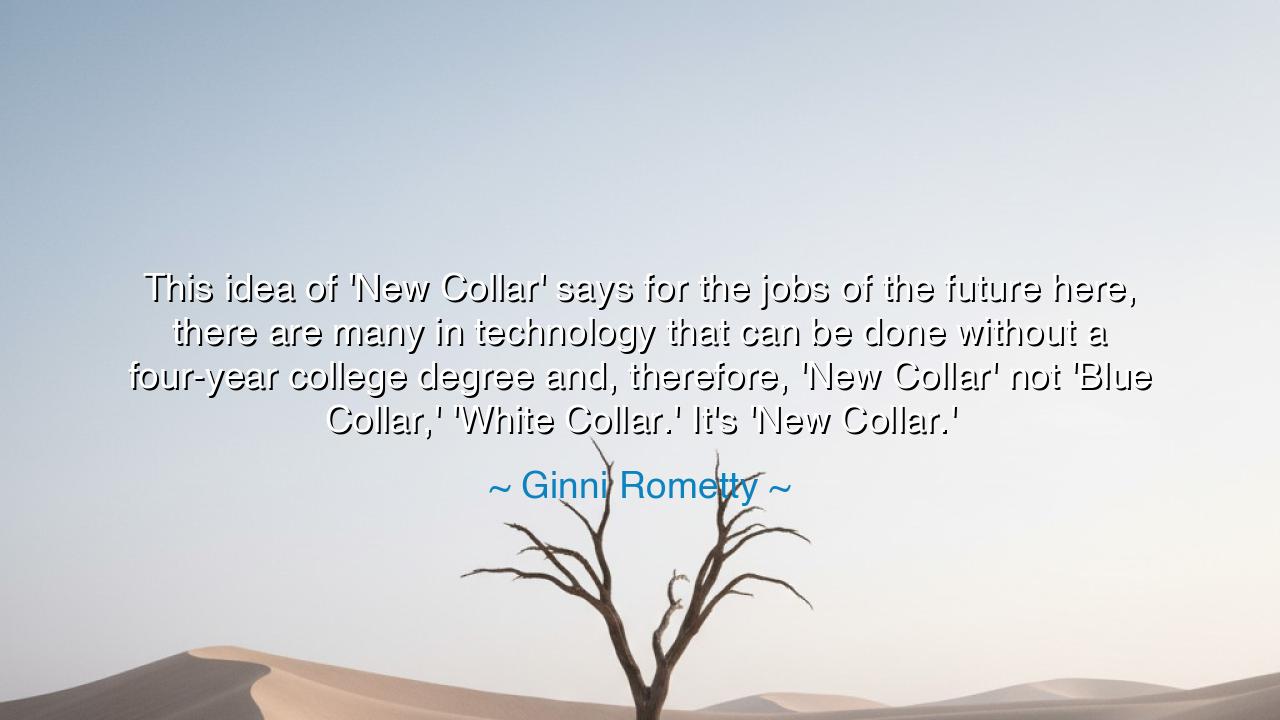
This idea of 'New Collar' says for the jobs of the future here
This idea of 'New Collar' says for the jobs of the future here, there are many in technology that can be done without a four-year college degree and, therefore, 'New Collar' not 'Blue Collar,' 'White Collar.' It's 'New Collar.'






Ginni Rometty once declared with foresight and conviction: “This idea of 'New Collar' says for the jobs of the future here, there are many in technology that can be done without a four-year college degree and, therefore, 'New Collar' not 'Blue Collar,' 'White Collar.' It's 'New Collar.'” In these words lies a new vision for labor, dignity, and opportunity. She reminds us that the destiny of the coming age is not confined to the rigid divisions of the past, but shaped by the skills of technology, which can be learned by the willing and mastered by the persistent.
The origin of this insight rests in her years as the leader of IBM, where she saw the technological revolution unfold before her eyes. As machines, data, and networks reshaped industries, Rometty recognized that the future of work would no longer be bound solely to formal credentials. The strength of a worker in the new age would not be in titles or diplomas, but in their ability to adapt, to learn, and to wield the tools of a rapidly changing digital world. Hence the birth of the idea of the “New Collar” worker—those who do not fit into the old categories of labor, but who carry skills forged for the needs of tomorrow.
History itself gives us witness to this truth. When the printing press was invented, it was not only scholars who gained power. Printers, typesetters, and artisans—those who had never sat in great universities—suddenly became the keepers of knowledge. Their craft reshaped society and birthed a new era. So too, in the industrial revolution, it was not merely aristocrats or scholars who built the age, but machinists, engineers, and technicians, many of whom had little formal schooling yet possessed the mastery of new tools. In every great transformation, it is those who adapt to new skills who hold the keys to the future.
Rometty’s words carry with them a heroic call to humility and inclusion. For too long, society has chained worth to the prestige of institutions, dismissing those who lacked the path of a four-year degree. Yet the “New Collar” path proclaims a different truth: that intelligence, discipline, and creativity can arise from any place, and that opportunity must not be bound to privilege. It is a reminder that wisdom does not belong only to the halls of the academy, but also to the workshop, the coding bootcamp, and the self-taught innovator.
This wisdom also speaks to the dignity of labor. The worker of the future, whether they sit at a console analyzing data, repair networks in the field, or design systems for health and safety, is no less noble than the scholars of old. To call them “New Collar” is to give them identity and honor, to remind the world that these roles are vital for the survival and flourishing of communities. The title itself becomes a shield against the arrogance of old hierarchies and a banner for a new age of equality in opportunity.
The lesson for all is profound: prepare not for the jobs of yesterday, but for the work of tomorrow. Do not despise humble beginnings, for from them can rise mastery of the most powerful tools of the age. Parents, teach your children that degrees are honorable, but skills are essential. Workers, embrace lifelong learning, for the tools of today will be replaced by the tools of tomorrow. Leaders, open the gates of opportunity to those who show competence, not only those who carry certificates.
Practical action flows from this vision. Communities must invest in training programs, apprenticeships, and technological literacy. Individuals must seize every chance to learn, whether in formal halls or through self-discipline. And above all, society must learn to respect the “New Collar” as the vanguard of a future where human potential is measured not by the past, but by the courage to meet the challenges of the present.
Thus let this teaching echo across generations: the world no longer belongs only to the Blue Collar or the White Collar, but to the New Collar—the builders of the digital age, the guardians of data and networks, the artisans of technology. Honor them, encourage them, and perhaps you will be one of them. For in their hands lies not only the future of work, but the future of civilization itself.






AAdministratorAdministrator
Welcome, honored guests. Please leave a comment, we will respond soon